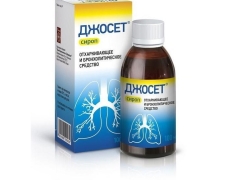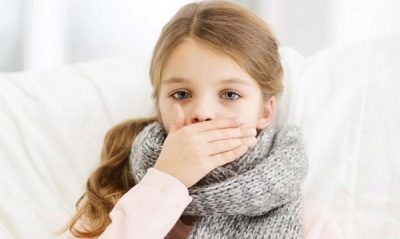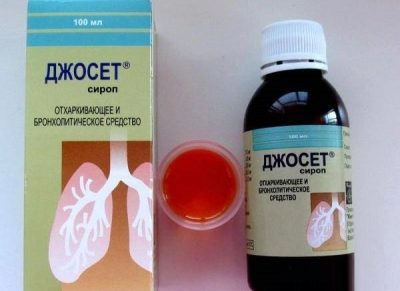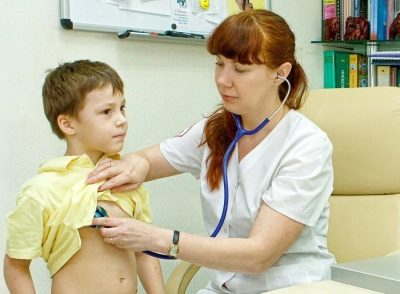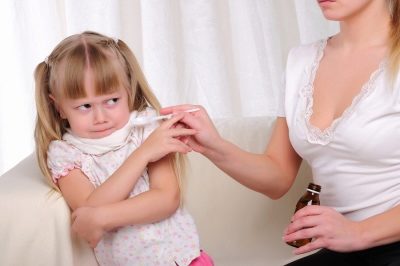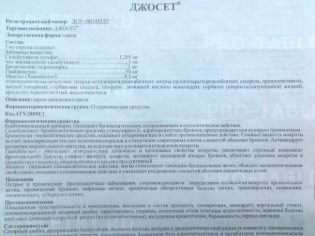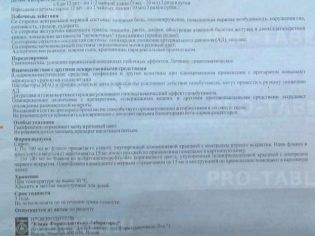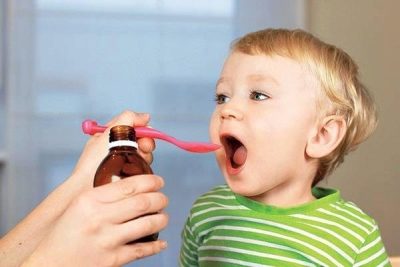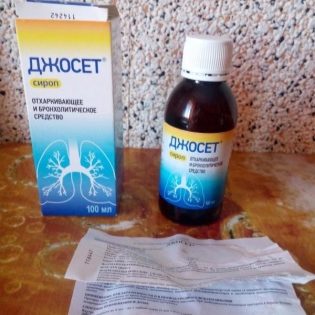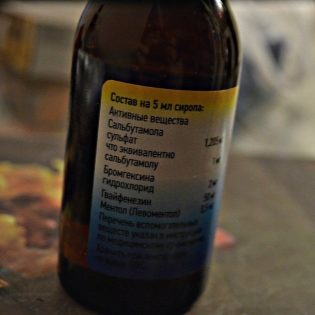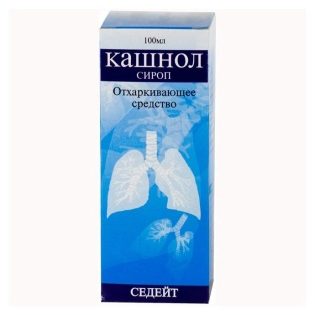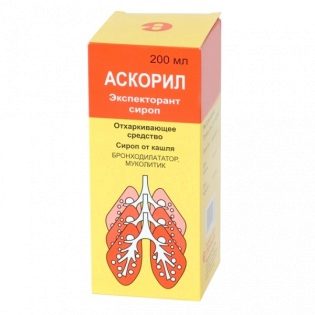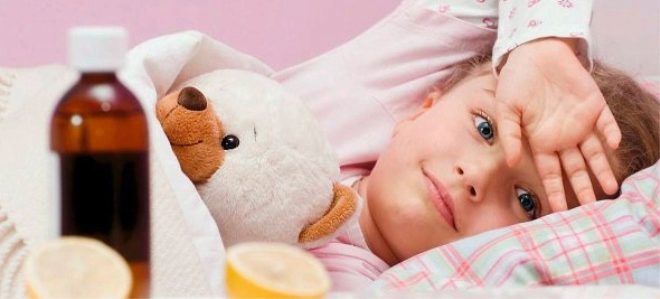Josset for children: instructions for use
When choosing a medicine with an expectorant effect, in most cases they stop on syrups. One of them is joset. Is this medicine prescribed to children when it helps and how do parents respond to this medicine?
Release form
Syrup is a sweet, thick orange liquid. The bottle of this drug can be made from both brown thermoplastic and orange glass. Inside one bottle contains 100 ml of syrup. The bottle is placed in a cardboard box with a measuring cup containing 15 ml of the medicine.
Composition
There are several active substances in the Dzhoset syrup, due to which the drug has a therapeutic effect:
- Salbutamol (in the form of sulfate). The amount of this ingredient in 5 ml of syrup is 1 mg.
- Bromhexine (in the form of hydrochloride). In 5 milliliters of medication it contains 2 mg.
- Gvayfenezin. The dosage of this component in 5 ml is 50 mg.
- Menthol (in the form of levomenthol). This ingredient is represented by a dose of 0.5 mg per 5 ml of the drug.
Additionally, the preparation includes water, methyl- and propyl sodium para-hydroxybenzoate, citric acid, sorbic acid, glycerol, and propylene glycol. The color and taste of the syrup is due to the presence of sodium saccharinate, sunset yellow dye, sorbitol and sucrose in its composition.
Operating principle
Present in the components have expectorant effect. They also have noted mucolytic and bronchodilatory effect.
- Salbutamol contributes to the expansion of the bronchi through stimulation of beta-2 adrenergic receptors, due to which bronchospasm is eliminated or prevented.
- Thanks to Bromhexin, the drug acts on the mucopolysaccharides in the bronchial secretions (destroys their connections) and stimulates the work of secretory cells. The result of this influence will be reduction of sputum viscosity and improvement of its expectoration.
- Guaifenesin also affects sputum (its adhesive properties), therefore, under the action of this component the viscosity of the secretion decreases, and its removal from the respiratory tract is facilitated.
- Menthol has an antispasmodic effect and an antiseptic effect. Such an ingredient soothes the mucous membrane and relieves its irritation, and also gently activates the work of the bronchial glands.
Indications
Dzhoset taken with dry cough, the cause of which may be:
- Pneumonia.
- Chronical bronchitis.
- Chronic pulmonary pathology with obstruction.
- Tracheobronchitis.
- Bronchial asthma.
- Pneumoconiosis.
- Emphysema.
- Tuberculosis of the lungs.
A video review of the drug can be viewed below:
At what age is it allowed to take?
The instruction to syrup does not contain information on age restrictions in use. However, the use of this medication in children under six years is better to coordinate with the pediatrician, observing the baby from birth, to ensure that there are no contraindications and there are grounds for treatment with this syrup.
Contraindications
The appointment of this cough syrup is not recommended for:
- Hypersensitivity to any of the components of such a drug.
- Myocarditis
- Renal failure.
- Diabetes in decompensation stage.
- Tachyarrhythmias.
- Glaucoma.
- Hepatic pathologies.
- Exacerbation of peptic ulcer.
- Aortic stenosis.
- Thyrotoxicosis.
- Gastric bleeding.
Precautions in the use of such drugs require children with hypertension and compensated diabetes, as well as young patients diagnosed with a past ulcer.
Side effects
- The nervous system of a child may react to taking the drug by dizziness, disturbed sleep, tremors, headache, nervous irritability or drowsiness. In rare cases, the drug provokes seizures.
- The children's digestive system, when treated with Joset, sometimes “responds” to diarrhea, nausea, or bouts of vomiting. Occasionally, the drug becomes the cause of acute peptic ulcer disease or increases the activity of liver enzymes.
- In some children, the remedy provokes an increase in heart rate and a decrease in blood pressure.
- Treatment with this medication can cause allergies, such as urticaria, skin rashes, or paradoxical bronchospasm.
- The urine of a child taking the drug may become pink. This is due to the presence of guaifenesin in the preparation and is not dangerous.
Instructions for use and dosage
Dzhoset recommend taking orally three times a day in the following dose:
- A child under 6 years old is prescribed 5 ml of the drug at the reception.
- A child of 6-12 years old is discharged at one time from 5 to 10 ml of syrup.
- A child over the age of 12 is prescribed to drink 10 ml of medicine at the reception.
At the same time, the syrup should not be washed down with any alkaline liquids. If the little patient wants to take the medicine, it is best to use plain water.
Overdose
A very high dose of syrup, for example, if a small child accidentally drank it in large quantities, leads to tachycardia, vomiting, drowsiness or irritability, collapse, loose stools, dizziness and other negative symptoms. Treat overdose is recommended symptomatically.
Interaction with other drugs
- If you prescribe the drug along with theophylline or other xanthines, it will increase the risk of tachyarrhythmia. The same effect is observed from the combination of the drug with beta-2 adrenostimuliruyuschimi drugs.
- With simultaneous treatment with Dzhoset and tricyclic antidepressants or MAO inhibitors, the effect of salbutamol in the syrup composition will increase, which can drastically lower blood pressure.
- Appointment with glucocorticoids or diuretics provokes hypokalemia.
- If Joset is given to the child along with codeine preparations or other antitussive drugs, this will become an obstacle to the removal of fluid secretions from the bronchi.
- Due to the presence of Bromhexine in the syrup, the simultaneous administration of antibiotics for microbial damage to the lungs will improve the penetration of such drugs into the lung tissue.
- The drug should not be given to patients along with any non-selective blockers that affect beta receptors.
Terms of sale
To buy the drug you need to have a prescription with your doctor.. In pharmacies, the price of 100 ml of Dzhoset varies from 180 to 220 rubles.
Storage conditions and shelf life
Keep the tool at home should be hidden from children at a temperature of not more than +30 degrees Celsius. Syrup expiration date - 3 years from the date of release.
Reviews
About the drug there are different reviews. Some parents praise such syrup for its effective action when coughing, reasonable price and pleasant taste. They confirm that Dzhoset quickly eliminates cough in the very first days of use and accelerates recovery from bronchopulmonary pathologies.
However, there are also negative opinions in which moms complain about side effects. (allergic or negative reaction from the digestive tract) and the lack of therapeutic action. Also, some parents find this syrup too sweet, or they note a very quick use of the medication.
Analogs
Instead of Dzhoseta, you can take medicines with the same composition - Kashnol and Ascoril. Couchnall is made in the form of a syrup, which is a red crimson liquid. This drug is packaged in bottles of 100 ml and 200 ml.
Ascoril it is produced in white tablets and in syrup (it is called Ascoril Expectorate), which in one bottle is 100 or 200 ml. These medicines have the same properties. They have similar indications and side effects.
In addition, cough for children discharged herbal preparations (Bronchipret, Dr. Mom, Prospan, Licorice Syrup, Gadelix), carbocysteine-based drugs (Bronchobos, Fluditec), ambroxol preparations (Ambrobene, Flamed, Ambrohexal, Lasolvan) and other drugs. Wherein It is recommended to choose the appropriate analogue together with a pediatrician, because only a doctor observing a child can determine what is best for a baby with a dry or wet cough.
Surely you will be interested to watch a video in which the famous Dr. Komarovsky, who is trusted by thousands of mothers, tells about the features of cough treatment in children:
